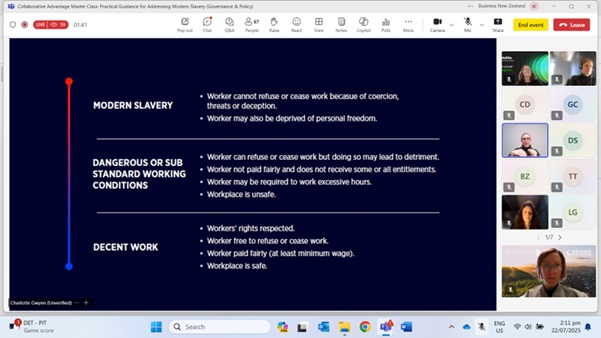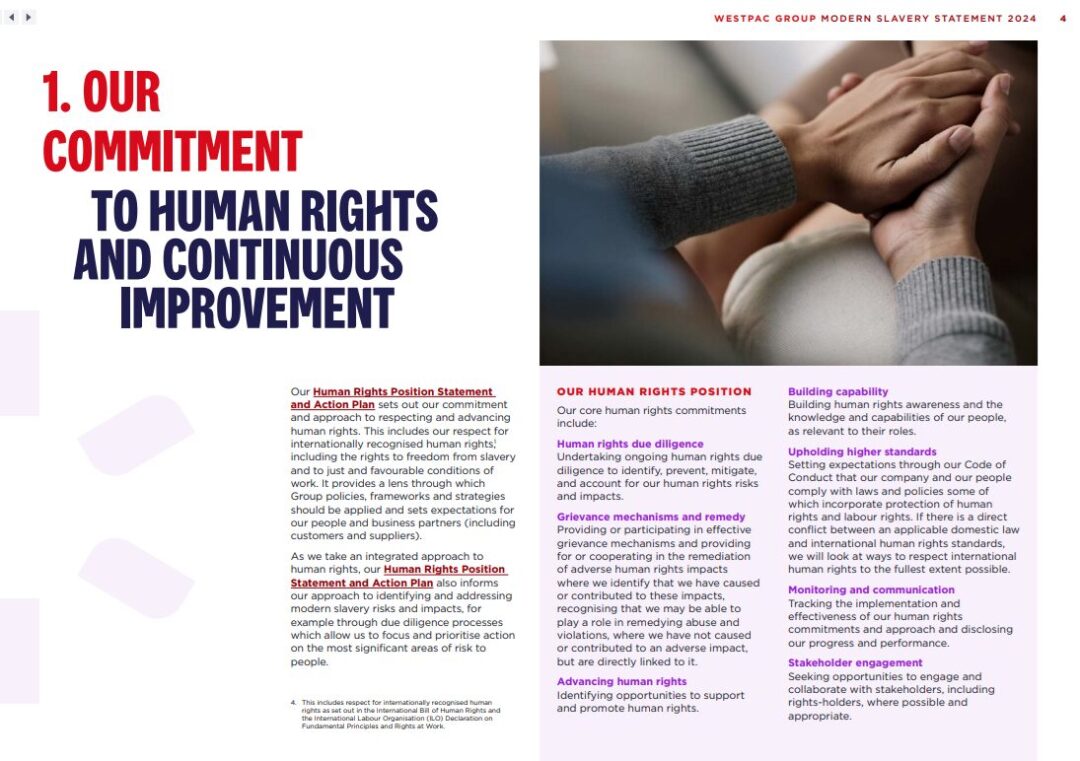By Jay Crangle (SBC’s Head of ESG)
I often say it’s one of SBC’s ‘special sauces’ (don’t sue me McDonald’s…) that we are able to curate spaces where businesses feel free to share their successes and challenges so openly.
The recent Collaborative Advantage Modern Slavery Online Masterclasses was no different. In partnership with Deloitte and Walk Free, it brought together a powerful mix of voices committed to tackling modern slavery in Aotearoa New Zealand and beyond.
Focusing on governance, risk assessment and remediation, the series focused on practical ways businesses could address exploitation in supply chains and operations.
Here are some of the key takeaways.
A wake-up call on hidden exploitation

It’s easy to take the ‘human’ out of ‘human rights.’ Sometimes, we get so stuck in managing risk, dealing with quantitative data and drafting policies that we forget it’s real people – over 49.6 million of us – who live in modern slavery of them.
And the challenges shared by participants in their efforts to stop this were sobering: opaque supply chains, excessive working hours, low visibility in subcontracting, and risks in migrant labour recruitment. These issues are not confined to distant shores—they’re present right here in New Zealand.
Where to start
Other than admiring her hair in a recent blogpost, I don’t know Erin Thomas, Director at human rights advocacy centre (ICAAD). But what she reflected in said blog post really resonated with me: “We often put human rights issues in the too-hard basket not because we lack data, but because we don’t want to face what we already know to be true.”
A theme of the call is that it can feel overwhelming tackling modern slavery. Many participants asked where they should even start, when they have so many suppliers, doing so many things, with so many people.
As Charlotte Gwynn (Walk Free) stated – and speaker’s supported – assessment should start internally and expand outward, prioritising suppliers based on geography, sector, and strategic value. Advanced tools like risk scoring and social listening platforms offer deeper insights into recruitment fees, document retention, and overtime practices—moving beyond static country labels to focus on actual risks.
Making remediation real
One of the session’s key themes was the importance of remediation—how organisations respond when harm occurs. One option is a principles-based remediation framework aligned with the UN Guiding Principles on Business and Human Rights (UNGPs).
Amy Sparks and Sam Shephard from Morrison illustrated how their modern slavery program integrates remediation into their reporting platform. Their approach emphasises transparency and rapid response.
Working with suppliers
Beyond social audits, businesses can take practical steps to ensure suppliers uphold labour rights. These include onboarding and training, supplier self-assessments, and open dialogue.
Phil Cumming (Sustainability and Ethical Sourcing GM, The Warehouse Group) emphasised how they put their relationships with suppliers, doing their due diligence while supporting suppliers to continuously improve their practices – and be transparent when things go wrong.
Embedding human rights into business strategy

Should your business adopt a standalone modern slavery policy or embed it within a broader human rights framework? The answer is it depends on internal structures, but many organisations benefit from a holistic human rights policy with a dedicated modern slavery section.
Sum Green highlighted this in her overview of Westpac’s approach, sagely remarking that while modern slavery statements are important, they are outputs of a broader strategy, not substitutes for policy.
Trust and transparency
Cam Bower of ethical labour investigation firm AIM CRI highlighted the real-world implications, revealing a fourfold increase in complaints over the past year. His investigations show how for many workers, reaching out for help is a last resort, making respectful, timely responses and victim support absolutely critical.
Grievance mechanisms are vital for enabling workers to raise concerns safely. Effective systems are accessible, multilingual, confidential, and impartial. Whether through hotlines, mobile apps, or in-person forums, these mechanisms must be trusted and responsive.
When a credible allegation arises, organisations should act swiftly—investigating, protecting affected individuals, and involving internal and external stakeholders. Having pre-planned scenarios and relationships with NGOs (like MERF or the Salvation Army) ensures a coordinated response.
Stop, collaborate and listen
The overarching message from the session was clear: addressing modern slavery requires proactive, collaborative, and principled action. As Sam (Morrisons) reminded us, waiting for an incident is not an option. Organisations must build trust, embed human rights into strategy, and continuously improve their processes.
Whether you’re just starting your journey or refining an existing program, the tools, frameworks, and insights shared in this session offer a roadmap for meaningful change. And as one speaker put it, “It doesn’t need to be perfect to be powerful.”
===
The session also spotlighted advocacy efforts for modern slavery legislation in New Zealand. World Vision has launched a campaign encouraging outreach to MPs and promoting bipartisan support. Business leaders are urged to get involved—letting representatives and business associations know that ethical supply chains matter.
More information and support on getting started on human rights due diligence can be found in SBC’s toolkit on this topic.

